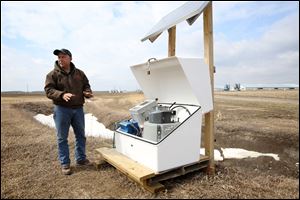
Ohio bill attempts to prevent toxic algae
Findlay senator looks to reduce harmful runoff in Lake Erie
3/26/2014
Terry McClure discusses the water runoff testing equipment situated on his land in Washington Township in Paulding County, Ohio.
COLUMBUS — A bill considered to be a step in the right direction in dealing with toxic algae blooms on Lake Erie is headed for a full Ohio House vote.
Beginning on Sept. 30, 2017, Senate Bill 150 would prohibit farm operations consisting of at least 50 noncontiguous acres from applying synthetic or chemical fertilizers to their land unless it is applied by someone certified by the state or working under the direction of someone who is certified.
The bill, sponsored by State Sen. Cliff Hite (R., Findlay), won unanimous approval of the House Agriculture and Natural Resources Committee on Tuesday as it did in the full Senate in January. But even its backers note that it’s just the first advance in a fight that will likely require tougher ammunition in the future.
It is designed to begin reducing the runoff of nutrients, particularly phosphorous, from entering the Lake Erie watershed and working their way to the lake, feeding algae growth that is endangering fishing, drinking water, and tourism.
“It is modest improvement, but it is improvement,” said Jack Shaner, of the Ohio Environmental Council. “Streams don’t know if the phosphorous is coming from fertilizer or manure. Today we got fertilizer. Tomorrow we’ll keep going after manure.
“This is fruit lying on the ground,” he said. “They need to reach up 2 inches from the ground and pluck that next low-hanging fruit of banning the surface application of manure on frozen and snow-covered ground.”
State Rep. Mike Sheehy (D., Oregon), a committee member, said he’s had language drafted for just such a bill.
“I’m really concerned that this portion of legislation was taken out of [Senate Bill] 150 early on in the process,” he said. “There’s a causal relationship between early spring thaw and the high algae blooms in the western basin of Lake Erie. I believe it’s largely caused by the [large factory farms] that are not properly policed.”
The Ohio Department of Agriculture will write the rules for the certification process, including training requirements and fees. Although enforcement of certification would not begin for another three years, the department would like to begin to offer voluntary fertilizer application training and certification in conjunction with existing pesticide application certification.
“It seems to me that this bill has a lot of work left to be done in rules — a lot,” said State Rep. Terry Boose (R., Norwalk), a committee member. “That bothers me a little bit.”
Until certification enforcement begins, the bill encourages agricultural operations to voluntarily adopt nutrient management plans that meet certain minimum standards.
The bill could reach the full House as soon as today and would then have to return to the Senate for ratification of the House changes.
Contact Jim Provance at: jprovance@theblade.com or 614-221-0496.